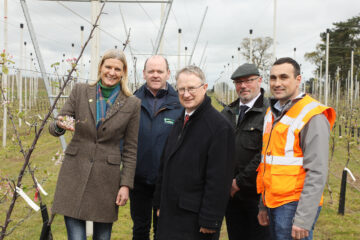More than eight out of ten farmers who participated in the Farmers Have Hearts’ Cardiovascular Health Programme made lifestyle changes to improve their heart health and have reduced their risk of having cardiovascular disease, a major study of farmers’ cardiovascular health has shown. The report was jointly launched today by Minister of State Martin Heydon TD, Department of Agriculture, Food and the Marine and Minister of State Frank Feighan TD, Department of Health.
The research found that over the course of one year, 81% farmers who took part in the Farmers Have Hearts’ Cardiovascular Health Programme (FHH-CHP) made lifestyle changes to improve their health. The findings show that 41% farmers improved their cardiovascular risk factor profile. This led to the number of farmers with four or more risk factors for cardiovascular disease (CVD) declining by 6% meaning they are less likely to have an acute cardiac event (stroke or heart attack) compared to those with more risk factors.
The lead author of the report on the health programme for farmers, Diana van Doorn stated, “though 6% may seem like a small change it is really significant. Farmers and agricultural workers in Ireland between 17 and 64 years of age are seven times more likely to die of circulatory disease than salaried employees. They are a very high risk group for CVD with 74% of all farmers at the start of our study having four or more risk factors. It is so positive to see a large group of farmers having improved their lifestyle and their cardiovascular risk profile. We saw improvements in key areas like blood pressure, cholesterol, waist circumference, and the experience of stress for many of the farmers who took part.”
Minister Martin Heydon T.D., stated, “farm safety, health and wellbeing is a priority for this government and this study provides more knowledge on how to engage with farmers and their families in order to help them improve their health and wellbeing. I am looking forward to measures being introduced which, building on this knowledge, will lead to an improvement in farmers’ health.”
Over eight hundred and sixty eight male drystock and dairy farmers in the south, south-east and midlands took part in the study over a one year period. This involved completing a health check at the start and end of this period and engaging in CVD health promoting behaviours like improving diet or getting more physical activity.
Dr David Meredith, Teagasc Research Officer stated, “internationally, there are few studies of this scale which means that we can have confidence in the effectiveness of the programme.”
Professor Catherine Blake, UCD, highlighted the long term nature of the study saying, “it is unusual for a study like this to run over 12 months and this helps shed light on when healthy behaviours are adopted and how they are sustained over the long run.”
Welcoming the report, Minister of State for Public Health, Well Being and National Drugs Strategy, Frank Feighan TD, stressed that, “the ‘Farmers Have Hearts Programme’ has shown what can be done by supporting farmers within the workplace through a structured programme that offers men an incentive to engage and positive supports throughout.”
The research was undertaken by Teagasc Walsh Scholar, Diana van Doorn, based at the National Centre for Men’s Health, IT Carlow. The Irish Heart Foundation part-funded the farmer health checks carried out at livestock marts with the Health Service Executive providing the balance of funding. Glanbia Ireland plc provided additional financial support which enabled over 400 of their milk suppliers to avail of the health checks and to take part in the programme whilst the UCD School of Public Health, Physiotherapy and Sport Science provided statistical expertise.
Head of Stakeholder Engagement and Communications, HSE Health and Wellbeing, Fergal Fox stated, “from a Healthy Ireland perspective – it’s great to see so many partners supporting men’s health through this initiative and it is heartening that so many of those that participated in the study benefited from it.”
Director of the National Centre for Men’s Health at IT Carlow, Dr Noel Richardson, explained that the study evaluated a health behaviour change intervention consisting of three delivery methods including Health Coaching by phone, M- Health (texting by mobile phone) and a combination of both approaches. A ‘usual care’ care group also participated in the initial and final health checks but continued with their normal health practices over the study period. “This approach enables us to assess the impact of taking part in a health behaviour change programme. It also generates the data we need to assess which approaches suit different groups of people.”
Welcoming the study, Janis Morrissey, Director of Health Promotion, Information & Training at the Irish Heart Foundation said, “cardiovascular disease is a leading cause of death and disability in Ireland. This research shows that while farmers have multiple heart and stroke risk factors, providing them with local access to health checks and tailored intervention programmes has real benefits. The Irish Heart Foundation intends to build on this important study with our partners, leading the next scale-up phase of the programme.”
Dr Stan Lalor, Teagasc Director of Knowledge Transfer stated that promoting Farmers Health in association with health agencies is a strong component of Teagasc’s commitment to improving the social sustainability of farming in Ireland. Previous Teagasc research established that Irish farmers have a high level of disability, with CVD being a significant cause, leading to both reduced farm income and off farm employment.
Dr John McNamara, the senior Teagasc Health and Safety Specialist, stated that “the results of this research show that with the right support farmers are strongly motivated to adopt and maintain healthier lifestyles. They provide strong evidence of the steps that help farmers.”
Commenting on the results of the study, Seán Molloy, Chief Ingredients and Agri Officer at Glanbia Ireland, said, “our business aims to make a difference in the communities in which we operate, as promised in our ‘Living Proof’ sustainability strategy launched last year. We were really pleased to support this programme which played an important role in raising awareness of health and well-being issues amongst our farm family suppliers and the farming community in general.”
Source: Teagasc



